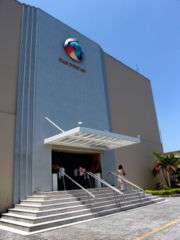RecordTV
RecordTV[lower-alpha 1] (Portuguese: [ʁeˈkɔɾ teˈve]) is a Brazilian free-to-air commercial television network established on September 27, 1953 by the businessman and media personality Paulo Machado de Carvalho. Its creation belongs to the television inauguration in Brazil, when Paulo Machado de Carvalho was interested by this media and wanted to expand its conglomerate (which was included several radio stations) to TV, which was the big news in the early 1950s. Paulo then filed a request to operate a television station in São Paulo, which was granted to him in November 1950,[2] shortly after the pioneering TV Tupi came on air.
 | |
| Type | Free-to-air television network |
|---|---|
| Country | Brazil |
| Availability | Nationwide |
| Founded | 27 September 1952 by Paulo Machado de Carvalho |
| Slogan | Reinventar é a nossa marca. (Reinventing is our brand.) |
| TV stations | 14 stations
|
| 5.1 points (2016)[lower-roman 1] | |
| Revenue | R$ 1.8 billion (2016)[lower-roman 2] |
| Headquarters | São Paulo, São Paulo |
| Parent | Grupo Record[lower-roman 3] |
Key people |
|
List
| |
List
| |
Picture format | |
List
| |
| Affiliates | See full list |
Official website | recordtv |
| Language | Portuguese |
Notes
| |
Finally inaugurated in 1953 on the São Paulo's channel 7, Record quickly fell in popularity, specializing in musical program production, becoming the audience leader in the 1960s with historical music festivals and the Jovem Guarda. In the mid-1970s, half of the channel was sold to businessman and TV host Silvio Santos, while the station was financially regressing and reaching pre-bankruptcy in the late 1980s.[3]
The formation of the national network began in the early 1990s, after the station was acquired by Edir Macedo, the Universal Church of the Kingdom of God founder and leader.[4][5][6][7] Since then, the channel began a major investment and a reconstruction phase that culminated in 2007,[8] consolidating as the second largest TV network in Brazil in audience and billing until 2015, when it was exceeded by SBT.[9] The position started to be played more intensively with the SBT from 2012, with both disputing tenth points and taking turns in the Ibope ranking.[10][11] Today, it is the third largest commercial television station in Brazil[9] and the 28th largest in the world ranking of 2012.[12][13][14] Record is also the oldest television station in activity in Brazil.[15]
Their studios are located in the district of Barra Funda, in São Paulo and are called Teatro Dermeval Gonçalves. The station also has a complex located in the neighborhood of Vargem Grande, in the West Zone of Rio de Janeiro, known as RecNov.[16]
History
1950s: Beginnings
TV Record started its transmissions on September 27, 1952. It was founded by Paulo Machado de Carvalho in São Paulo, as a competitor for then-dominant Rede Tupi from Diários Associados. It broke the three-year-old monopoly the station had in the city. It originally broadcast entertainment shows, sports, journalism, comedies and plays. In the 1950s, TV Record became recognized for their sports broadcasts. In 1959, it started airing shows featuring international entertainment figures, such as Charles Aznavour, Nat King Cole, Ella Fitzgerald, and Marlene Dietrich.
1960s: Record's Golden Age

The 1960s were considered Record's "Golden Age". The peak of Record's ratings were in the 1965–1970 period, when it became well known for its musical programs showcasing Bossa Nova and Jovem Guarda artists, and its MPB Music Festivals, which opened the doors to Tropicália. It was also during the 1960s that it aired its comedic series Família Trapo, created in 1967. That year, it started to lead the newly founded Rede de Emissoras Independentes (Independent Broadcasting Networks), whose stations aired Record programs and were its first affiliates. In 1968 Record's fortune started to change, because of a series of fires that handicapped its production capability. Brazilian public tastes began to be attracted to the telenovelas of Rede Globo.
1970s: New decade, new problems
The station sold 50% of its shares to Silvio Santos in 1971, but Record did not regain its higher ratings. It was the first television to broadcast in color in 1966, during the Festa da Uva (Grape Festival) in Caxias do Sul, together with TV Rio and TV Difusora. It would later be broadcast in full-color in 1970. Before this, transmissions in color since 1962 were experimental. TV Record had programming based on TV series, movies and cartoons, and TV shows, as well as its news programming.
1980s: The decline gets worse
The formation of SBT in 1981 marked more competition and the deepening of Record's decline. In most of the 1980s, Record suffered from very low ratings, no stars in its casts, and a lack of compelling programming, aside for it being the official station for Programa Silvio Santos (which would last until 1987) and other SBT programs. However, the channel scored a victory in 1984 with Jornal da Record's 2-hour telecast (the first station to do so), broadcast in select Brazilian cities, as well as in the promotion of Brazilian country music (música sertaneja) though Marcelo Costa's Especial Sertanejo. Record also began its transition into a national network with the 1982 opening of its Rio station.
1990s: Record's resurgence
In 1989, Sílvio Santos and Paulo Machado de Carvalho's family sold Record to Edir Macedo and his Igreja Universal do Reino de Deus. The following year Record became a national channel, in conjunction with their 37th anniversary of broadcasting, debuting its current logo, and later that year began satellite broadcasts, returning to Rio in 1993. Given the Pentecostal connections of the new leadership it's no surprise that Record's long line of religious programming would be traced to its relaunch.
On October 12, 1995, the network became infamous throughout the country because of the "Kicking of the saint" episode, aired during the church's late night program.

Under Macedo, the new owners started to rebuild Record's public image, identifying as Rede Record and signing broadcasting affiliates throughout Brazil. Through most of the 1990s and the first half of the 2000s, Record invested in popular programming, signing stars such as Ana Maria Braga (who left to go to Globo in 1999 and had a long career in other networks) and Carlos "Ratinho" Massa (in SBT since 1998). It changed its programming in several ways, adding more sports coverage (for instance, broadcast the World Cup 1998); investigative journalism (with Câmera Record) and many others. It added several United States series, such as Star Trek, The X-Files, Millennium and The Three Stooges (also including, in later years, House, M.D., Monk, and CSI: Crime Scene Investigation and its spin-offs). It also added educational children's shows, and cartoons from world markets, such as Dexter's Laboratory and the anime Pokémon.
2000s: On the way to leadership
In 2000 Adriane Galisteu joined the network, one of so many to join its ranks as the 21st century started.
In 2003, TV Record celebrated its 50th anniversary of its launch in São Paulo, thus with this achievement Record is today the longest-running and oldest existing Brazilian television network. In 2004, it began using a new slogan, A Caminho da Liderança ("On the way to leadership"), and released new programming (among them was Domingo Espetacular, which would soon pose as serious competition to the long-dominant Fantastico of Rede Globo). Despite the critics, the channel has taken a page from Globo's success and started to invest heavily in telenovelas, like Essas Mulheres and Ribeirão do Tempo. It has also tried to make its announcers and journalists look more like its main competitor. It did not renew the contract of its anchor, Boris Casoy, who moved to Rede Bandeirantes as a result.
In 2007, Record, for the first time, occupied 2nd place in São Paulo's ratings.[17] Its goal was to take over leadership in the 2010s.[8] Two years later, in 2009, Record's audience in Rio surpassed that of Globo after airing the blockbuster Brazilian action film The Elite Squad. At the same time, the network soon debuted its very own news channel, Record News, and began its international service as well.
2010s: Record today


In a first for the network, Record signed with the International Olympic Committee for the exclusive rights for the free-to-air television to the 2010 Winter Olympics and the 2012 Summer Olympics.[18][19] The network also holds, until 2019, the Pan-American Games broadcasts rights.
IBOPE surveys confirmed that Record enjoyed a 101% increase in its audience in São Paulo, (from 2003) and an astonishing 270% increase in its audience in Rio de Janeiro (from 2002). In the same survey, in São Paulo, Globo suffered a 26% decline in its audience, while SBT lost 37% of its audience, while in Rio de Janeiro, Globo's audience dropped by 30%, whereas SBT lost 17%. It was different in 2014 when SBT regained its 2nd place in the national ratings, while Record was pulled down to 3rd place overall.
2014 marked the first time both Rede Record and Record News broadcast the 2014 Winter Olympics together.
It was indeed in recent years that Record's long line of locally produced and imported programs, including new US programs (Chicago P.D. and Spartacus for example) had made it one of the best stations in Brazil today, reinforced by program hosts in the variety and reality programs and newsreaders in the local and national levels, several of them with long years of service in other stations. By 2015, it has become the pioneer Latin American TV network to produce programs in 4K and the first ever to produce a Bible-based telenovela, beating others in the process. It can be noted that since 2004 Bible-themed miniseries have been also a part of Record's programming.
On November 24, 2016, the network changed its name to RecordTV and unveiled a modified version of its logo which dropped the RGB colors.
List of active programs on Record channels
Reality shows/Game shows
- A Fazenda (The Farm)
- Batalha dos Confeiteiros (Next Great Baker)
- Power Couple
- Dancing Brasil (Dancing with the Stars)
- A Casa (Get The F*ck Out Of My House)
- Canta Comigo (All Together Now)
- The Four Brasil (The Four: Battle for Stardom)
- Anfitrião do Fantasma
- Isso Eu Faço
- Muro dos Famosos (Wall of Fame) (2017) - (Legendários)
- Batalha dos Cozinheiros (2016)
- Got Talent Brasil (Got Talent) (2013)
- Me Leva Contigo (Taken Out) (2014)
- Topa um Acordo? (Let's Make a Deal) (2014) (Hora do Faro)
- Além do Peso (Cuestión de peso) (2013-2015) - (Programa da Tarde and Hoje em Dia)
- Ídolos Kids (Idols Kids) (2012-2013)
- Amazônia (2012)
- Top Model, o Reality (2012)
- A Casa da Ana Hickmann (2011) - (Tudo É Possível)
- Game Show (2009-2011)
- O Preço Certo (The Price Is Right) (2009-2010)
- Gugu bate em sua porta (Opportunity Knocks) (2009) - (Programa do Gugu)
- Ídolos (Idols) (2008-2012)
- Distração Fatal (Distraction) (2008) - (O Melhor do Brasil)
- Troca de Família (Trading Spouses / Wife Swap) (2006-2016)
- Brazil's Next Top Model (2007-2009)
- O Jogador (PokerFace) (2007-2008)
- O Aprendiz (The Apprentice) (2004-2014)
- Extreme Makeover Social (Extreme Makeover) (2010-2012)
- Simple Life: Mudando de Vida (The Simple Life) (2007)
- Sem Saída (Captive) (2004)
- Roleta Russa (Russian Roulette) (2002-2003)
- Top TV (2000-2001)
- Quarta Total (1999-2002)
- O Vencedor (The Winner Is) (discontinuation in pursuing the project)
- A Caçada (The Chase) (uncertainty)
- O Cubo (The Cube) (uncertainty)
- Quem Está no Topo? (Who's on Top?) (uncertainty)
- (Iron Chef) (future?)
Centers and affiliates
RecordTV owns TV stations in São Paulo (São Paulo), Rio de Janeiro (Rio de Janeiro), Brasília (Distrito Federal), Belo Horizonte (Minas Gerais), Goiânia (Goiás), Salvador (Bahia), Belém (Pará), Recife (Pernambuco) and Florianópolis (Santa Catarina). In February 2007, it announced the buyout of TV Guaíba, in Porto Alegre, Rio Grande do Sul.[20]
International broadcasting
RecordTV Internacional is the international service of RecordTV. It is available in North America, Europe, Africa—including Uganda, and (since 2008) Asia.[21]
Criticism
RecordTV is sometimes referred as a biased network due to its close relationship with a neopentecostal church. Edir Macedo, currently Record's owner, is also the leader and principal bishop of the Universal Church of the Kingdom of God. RecordTV commonly provides daily broadcasting time to religious programs and some of their executive team also share specific roles within the church.
The station also receives criticism from leaders of the rival Assembly of God church, who accuse Macedo, his church, and the station of promoting immorality by broadcasting sexually-oriented television programs.[22]
See also
- Rádio Record, the RecordTV's radio network.
- Record News, the RecordTV's news channel.
- List of miniseries of RecordTV, a list of miniseries produced by RecordTV.
- Rede Globo, SBT and TV Band, other Brazilian TV networks.
Notes
- The name is spelled without space between the words "Record" and "TV". Such nomenclature was adopted after a rebranding in its mark in November 2016. Until then, it was called "Rede Record" or "TV Record". The station is also referred to only as "Record".[1]
References
- Daniel Castro (17 November 2016). "Após perder 'caminho da liderança' e virar 'TV de primeira', Record 'se reinventa'". Notícias da TV (in Portuguese). UOL. Retrieved 19 November 2017.
- "TV Record" (in Portuguese). Pró-TV. Archived from the original on 6 July 2015. Retrieved 19 November 2017.
- Macedo, Edir (2012). Nada a Perder: Momentos de Convicção Que Mudaram Minha Vida (in Portuguese). São Paulo: Editora Planeta. p. 49. ISBN 9788576658931.
- Luiz Sugimoto (8–14 May 2006). "A respeito das crendices em torno dos crentes". Jornal da Unicamp (in Portuguese). University of Campinas. Retrieved 19 November 2017.
- Sabrina Grimberg (13 October 2007). "Bispo Macedo vai para o ataque" (in Portuguese). O Dia. Archived from the original on 22 May 2011. Retrieved 19 November 2017.
- "Ao lado de Lula, Edir Macedo ataca Globo em lançamento de TV" (in Portuguese). O Estado de S. Paulo. 27 September 2007. Archived from the original on 26 October 2007. Retrieved 19 November 2017.
- Claudio Leal (3 October 2007). "ONG representará contra a Record News". Terra Magazine (in Portuguese). Terra. Retrieved 19 November 2017.
- Carmen Pompeu (16 March 2007). "Vamos bater a Globo até 2009, diz vice-presidente da Record". Ilustrada (in Portuguese). Folha de S.Paulo. Retrieved 19 November 2017.
- "SBT bate Record pela quinto mês seguido como segunda maior audiência da TV". E+ (in Portuguese). O Estado de S.Paulo. 3 May 2016. Retrieved 19 November 2017.
- "SBT completa sete meses à frente da Record em audiência". F5 (in Portuguese). Folha de S.Paulo. 4 February 2015. Retrieved 19 November 2017.
- "Record assume a vice-liderança em todo o país no mês de setembro". R7 Diversão (in Portuguese). R7. 2 October 2015. Retrieved 19 November 2017.
- Heloisa Tolipan (9 May 2012). "Globo sobe em ranking e torna-se segunda maior emissora do mundo!" (in Portuguese). Jornal do Brasil. Retrieved 19 November 2017.
- "Globo se torna a segunda maior emissora de TV do mundo" (in Portuguese). Comunique-se. 10 May 2012. Archived from the original on 12 May 2012. Retrieved 19 November 2017.
- "Rede Globo se torna a 2ª maior emissora do mundo" (in Portuguese). O Fuxico. 11 May 2012. Retrieved 19 November 2017.
- "Record completa 60 anos como a emissora mais antiga em atividade no Brasil" (in Portuguese). Portal Imprensa. 29 September 2013. Retrieved 19 November 2017.
- João Gabriel Batista (4 June 2013). ""Pecado Mortal" poderá ser a última novela da Record no RecNov; entenda". NaTelinha (in Portuguese). UOL. Retrieved 19 November 2017.
- Record se torna vice-líder na TV aberta na Grande SP "Folha de S. Paulo" 01/03/2007
- , Cidade Biz
- "Press release re: Brazil network", Olympic Committee
- , Cidade Biz
- "Brazil's Rede Record Internacional TV reaches Asia". On Screen Asia. Archived from the original on February 10, 1012.
- "Evangelicals take their fight with Satan to the streets of Sao Paulo".